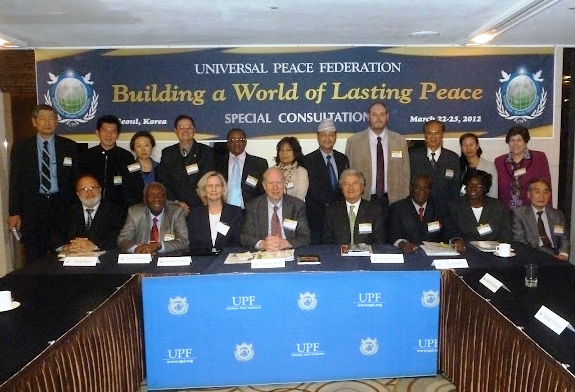![]()
The Words of the Kagawa Family
|
|
The Words of the Kagawa Family |

Seoul, Korea -- The Universal Peace Federation convened a Special Consultation on "The Role of Intergovernmental, Non-governmental, and Faith-based Organizations in Building a World of Lasting Peace" at the Riviera Hotel, Seoul, Korea, from March 22 to 25.
During Session I, "UPF's Mission, Values and Core Programs," Dr. Thomas G. Walsh, President of UPF, described the mission of UPF, its core values, and four main areas of work: interfaith cooperation, marriage and family, education, and renewal of the United Nations. He underscored the ideal of humanity as "One Family under God" united together beyond race, religion, nationality, and culture.
Session II, entitled "United Nations Renewal and the Significance of Faith-based Organizations," was guided by Mr. Taj Hamad, Secretary General of UPF. He spoke about the role of NGOs at the United Nations and the significance of the landmark observance of the World Interfaith Harmony Week at the UN General Assembly this past February. There is a need for renewal of the United Nations, emphasized Mr. Hamad; however, the spiritual aspect must be included, as an asset to bringing world peace. Ms. Carolyn Handschin-Moser, Deputy Director of the Office of UN Relations, UPF-Geneva, talked about their office's best practices, including the "Model UN" programs for youth and programs on the family, disarmament, inter-religious peace-building, multiculturalism, and women's issues.
The afternoon sessions on the topics of "The Idea of an 'Abel UN' in the Asia Pacific Era, with Prospects for Regional Alliances" and "Where Do We Go from Here?" gave opportunity for the distinguished participants to offer their reflections and recommendations. H.E. Dr. Hasan Muratovic, former Prime Minister of Bosnia and Herzegovina, voiced the opinion that the UN has been unable to effectively enforce its directives. Muratovic affirmed the importance of interfaith cooperation while also seeing a great need to prevent irresponsible leaders and ruthless dictators from taking power. He advised UPF to create an association for peacekeeping and to initiate a peace award similar to the Nobel Peace Prize.
Dr. Hamdi Mohammad Murad, Co-founder of the Jordanian Interfaith Co-Existence Research Center, argued that the United Nations has strayed far from its original goal, maintaining that the UN had lost its internal aspect and, therefore, had become weak. NGOs, representing the voice of the people, have the credibility to do something to prevent the world from descending into a global war. The UN needs spiritual reform, he said. As the Asia-Pacific region becomes more important, a culture of peace will be needed to prevent rising military powers from imposing a dictatorial regime.
Professor Masahisa Hayashi, President of the Institute for Peace Policies in Japan, noted that the League of Nations failed and could not prevent World War II. In turn, if the United Nations cannot resolve global issues, then it too will fail. Before that happens, efforts should be made to reform the UN.
Dr. Chula Bahadur Shrestha, Editor-in-Chief of the Universal Times National Weekly newspaper in Nepal, put forward the view that people should consider not only their rights but also their responsibilities. "We need a values-based approaches with a humanitarian aspect," he said, "upholding human dignity and freedom in order to win the hearts of the people."
Mr. Takahiro Ninomiya, Special Assistant to the Secretary General of Diet Member's Council for Comprehensive Security of Japan, focused on the unique security position of Japan, which is limited to a defensive posture based on its constitution. There is a necessity for Japan to strengthen its alliances in Asia in order to be protected against threats. He suggested that Japan have greater cooperation with the United States and a defense alliance treaty to enhance its security system.
Dr. Vladimir Evgenievich Petrovsky, Deputy Chief Representative in China of RIA Novosti Beijing Office, commented on the proposal for an Asia Pacific Association for Peace and Development that was presented by Dr. Walsh. As in case of the European Union in previous years, there should be three area of cooperation: 1) economic, 2) human rights, 3) military. This type of association could provide a basis for UPF to achieve observer status with major international organizations.
Dr. Thomas G. Walsh closed the consultation, noting that the United Nations did not come about just because of utopian idealists. It was largely in response to the horrors of World War II and the deaths of millions of civilians. Perhaps serious reform of the UN may about only if humanity is confronted with a global crisis.